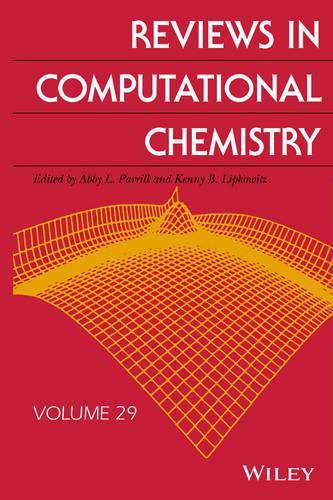Readings Newsletter
Become a Readings Member to make your shopping experience even easier.
Sign in or sign up for free!
You’re not far away from qualifying for FREE standard shipping within Australia
You’ve qualified for FREE standard shipping within Australia
The cart is loading…






The Reviews in Computational Chemistry series brings together leading authorities in the field to teach the newcomer and update the expert on topics centered on molecular modeling, such as computer-assisted molecular design (CAMD), quantum chemistry, molecular mechanics and dynamics, and quantitative structure-activity relationships (QSAR). This volume, like those prior to it, features chapters by experts in various fields of computational chemistry. Topics in Volume 29 include:
Noncovalent Interactions in Density-Functional Theory Long-Range Inter-Particle Interactions: Insights from Molecular Quantum Electrodynamics (QED) Theory Efficient Transition-State Modeling using Molecular Mechanics Force Fields for the Everyday Chemist Machine Learning in Materials Science: Recent Progress and Emerging Applications Discovering New Materials via a priori Crystal Structure Prediction Introduction to Maximally Localized Wannier Functions Methods for a Rapid and Automated Description of Proteins: Protein Structure, Protein Similarity, and Protein Folding
$9.00 standard shipping within Australia
FREE standard shipping within Australia for orders over $100.00
Express & International shipping calculated at checkout
The Reviews in Computational Chemistry series brings together leading authorities in the field to teach the newcomer and update the expert on topics centered on molecular modeling, such as computer-assisted molecular design (CAMD), quantum chemistry, molecular mechanics and dynamics, and quantitative structure-activity relationships (QSAR). This volume, like those prior to it, features chapters by experts in various fields of computational chemistry. Topics in Volume 29 include:
Noncovalent Interactions in Density-Functional Theory Long-Range Inter-Particle Interactions: Insights from Molecular Quantum Electrodynamics (QED) Theory Efficient Transition-State Modeling using Molecular Mechanics Force Fields for the Everyday Chemist Machine Learning in Materials Science: Recent Progress and Emerging Applications Discovering New Materials via a priori Crystal Structure Prediction Introduction to Maximally Localized Wannier Functions Methods for a Rapid and Automated Description of Proteins: Protein Structure, Protein Similarity, and Protein Folding